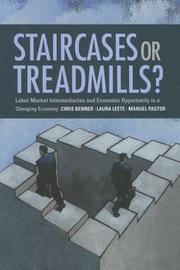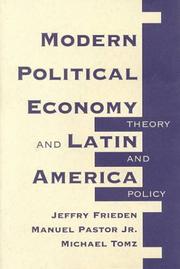| Listing 1 - 5 of 5 |
Sort by
|
Book
ISBN: 1620973308 9781620973301 9781620973295 1620973294 9781620975572 1620975572 Year: 2018 Publisher: New York
Abstract | Keywords | Export | Availability | Bookmark
 Loading...
Loading...Choose an application
- Reference Manager
- EndNote
- RefWorks (Direct export to RefWorks)
Political planning --- Planning in politics --- Public policy --- Planning --- Policy sciences --- Politics, Practical --- Public administration --- California --- Politics and government
Book
ISBN: 0520960041 9780520960046 9780520284418 0520284410 Year: 2015 Publisher: Oakland, California University of California Press
Abstract | Keywords | Export | Availability | Bookmark
 Loading...
Loading...Choose an application
- Reference Manager
- EndNote
- RefWorks (Direct export to RefWorks)
In the last several years, much has been written about growing economic challenges, increasing income inequality, and political polarization in the United States. Addressing these new realities in America’s metropolitan regions, this book argues that a few lessons are emerging: first, inequity is bad for economic growth; second, bringing together the concerns of equity and growth requires concerted local action; and third, the fundamental building block for doing this is the creation of diverse and dynamic epistemic (or knowledge) communities, which help to overcome political polarization and to address the challenges of economic restructuring and social divides.
Cities and towns --- Regional planning --- Income distribution --- Economic development projects --- Economic development --- Development, Economic --- Economic growth --- Growth, Economic --- Economic policy --- Economics --- Statics and dynamics (Social sciences) --- Development economics --- Resource curse --- Development projects, Economic --- Projects, Economic development --- Economic assistance --- Technical assistance --- Regional development --- State planning --- Human settlements --- Land use --- Planning --- City planning --- Landscape protection --- Global cities --- Municipalities --- Towns --- Urban areas --- Urban systems --- Sociology, Urban --- Economic policy. --- Social aspects --- Government policy --- United States --- Economic conditions --- Regional planning. --- Income distribution. --- Economic development projects. --- Cities and towns. --- Social aspects. --- Distribution of income --- Income inequality --- Inequality of income --- Distribution (Economic theory) --- Disposable income --- regional planning --- economic development --- cities and towns - united states --- income distribution --- economic policy --- urban development --- Race and ethnicity in the United States Census --- San Antonio
Book
ISBN: 0801447216 0801459125 9780801459122 9780801447211 9780801474620 0801474620 9780979226656 0979226651 Year: 2010 Publisher: Ithaca, NY
Abstract | Keywords | Export | Availability | Bookmark
 Loading...
Loading...Choose an application
- Reference Manager
- EndNote
- RefWorks (Direct export to RefWorks)
For nearly two decades, progressives have been dismayed by the steady rise of the right in U.S. politics. Often lost in the gloom and doom about American politics is a striking and sometimes underanalyzed phenomenon: the resurgence of progressive politics and movements at a local level. Across the country, urban coalitions, including labor, faith groups, and community-based organizations, have come together to support living wage laws and fight for transit policies that can move the needle on issues of working poverty. Just as striking as the rise of this progressive resurgence has been its reception among unlikely allies. In places as diverse as Chicago, Atlanta, and San Jose, the usual business resistance to pro-equity policies has changed, particularly when it comes to issues like affordable housing and more efficient transportation systems. To see this change and its possibilities requires that we recognize a new thread running through many local efforts: a perspective and politics that emphasizes "regional equity." Manuel Pastor Jr., Chris Benner, and Martha Matsuoka offer their analysis with an eye toward evaluating what has and has not worked in various campaigns to achieve regional equity. The authors show how momentum is building as new policies addressing regional infrastructure, housing, and workforce development bring together business and community groups who share a common desire to see their city and region succeed. Drawing on a wealth of case studies as well as their own experience in the field, Pastor, Benner, and Matsuoka point out the promise and pitfalls of this new approach, concluding that what they term social movement regionalism might offer an important contribution to the revitalization of progressive politics in America.
SOCIAL SCIENCE --- Sociology / General --- Regional planning --- Regionalism --- Regional disparities --- Community development, Urban --- Community organization --- Metropolitan areas --- Social movements --- Sociology & Social History --- Social Sciences --- Communities - Urban Groups --- Social aspects --- Regional development --- State planning --- Disparities, Regional --- Government policy --- Human geography --- Nationalism --- Interregionalism --- Human settlements --- Land use --- Planning --- City planning --- Landscape protection

ISBN: 1610440439 9780871541697 0871541696 9781610440431 Year: 2007 Publisher: New York
Abstract | Keywords | Export | Availability | Bookmark
 Loading...
Loading...Choose an application
- Reference Manager
- EndNote
- RefWorks (Direct export to RefWorks)

ISBN: 0429978529 0367316889 0429967446 0429498896 1429490942 9781429490948 0813324173 9780813324173 0813324181 9780813324180 Year: 2000 Publisher: Boulder, Colo. Westview Press
Abstract | Keywords | Export | Availability | Bookmark
 Loading...
Loading...Choose an application
- Reference Manager
- EndNote
- RefWorks (Direct export to RefWorks)
This is a reader that applies the newest debates in political economy to the analysis of Latin America in a way that is thematically and theoretically cohesive. Modern Political Economy and Latin America consists of carefully selected, edited readings in Latin American political economy. The editors, Jeffry Frieden and Manuel Pastor, Jr., include an introductory chapter, and a concluding article as well as brief introductions to all sections. These inclusions will make explicit the theoretical underpinnings of each article, and will highlight their respective contributions to the ongoing debates in Latin America. } Modern Political Economy and Latin America consists of carefully selected, edited readings in Latin American political economy. The editors, Jeffry Frieden and Manuel Pastor, Jr., include an introductory chapter, and a concluding article as well as brief introductions to all sections. These inclusions will make explicit the theoretical underpinnings of each article, and will highlight their respective contributions to the ongoing debates in Latin America.Latin American economies are undergoing profound transformations. And, in the wake of a decade-long debt crisis, the statist models of the past are giving way to a reliance on the market even as authoritarian rule seems to have ebbed in favor of new or reborn democratic institutions. As a result, the policy framework guiding economic and political development is likely to be fundamentally different. The analysis of Latin America needs a strong dose of modern political economy--one that can bring the area studies field up to date with the recent developments on the theoretical end of the economics and political science professions. This book helps fill that need. }
Cakchikel Indians --- Cakchikel philosophy. --- Earthquakes. --- Economic history. --- Economic policy. --- Political violence. --- Politics and government. --- Social conditions. --- Wirtschaft. --- Social life and customs. --- Latin America --- Economic conditions.
| Listing 1 - 5 of 5 |
Sort by
|

 Search
Search Feedback
Feedback About UniCat
About UniCat  Help
Help News
News